Information Security and the Importance of its Support System
So, what is information security? It is usually known for protecting information and a business from accidental activities that can damage employees and managers. Furthermore, information security ensures that a company is prevented from any security risk.
Information leakage might lead to various difficulties for a corporation, including significant economic losses or even complete bankruptcy. More often, financial documents, technological and design developments, logins, and passwords for entering the network of other organizations are “leaking out” from companies. However, severe damage can happen, such as a leak of employees’ data. You need to keep private information protected.

PCI Information Security and Why It Is Important
After major hackings of card payment systems in recent years, organizations facing card hacking issues began actively discussing implementation and compliance with information security standards.
The survey included IT executives from education, financial services, government, health, and retail responsible for PCI compliance. Furthermore, the researchers aimed to assess PCI DSS standards accurately, measure implementation costs, identify compliance challenges, and evaluate technology adoption.
- 70% of respondents believe compliance with the PCI DSS standard makes their organizations more secure.
- 87% of respondents believe that the requirements of the PCI DSS standard are necessary for the protection of cardholders’ data.
- Of all industries, the PCI DSS requirements of retailers and financial institutions proved to be the best. Retail took the most severe attitude towards the implementation of this standard.
- 67% of respondents expect their compliance expenses with the PCI DSS standard to increase in the next year. Increased costs mean company executives and board members consider PCI DSS a significant initiative.
- In addition, 60% of the respondents suggested that efforts to comply with the PCI DSS standard can stimulate other networks and network security projects.

Payment Card Industry and Data Security Standard
The standard for the protection of information in the field of payment cards
The PCI DSS standard is designed to ensure the security of processing, storing, and transferring data in information systems of companies operating with international payment systems such as Visa, MasterCard, and others. The PCI standard establishes the PCI Security Standards Council community, which contains the leading payment cards in the world, such as MasterCard Worldwide, American Express, Visa International, and JCB. The PCI DSS standard applies to every company that processes, stores, or transfers data from other economic sectors (banks, processing centers, service providers, and e-commerce systems). Moreover, you can also use bookkeeping to keep the client’s financial records, such as bank and economic sectors, to ensure that all the client’s data and information are secured.
PCI standards are operated worldwide and concern all organizations that process credit cards and store or transmit information about their holders. However, this standard gives the payment card industry more control over confidential data and excludes the possibility of their leakage. PCI also guarantees the protection of consumers from fraud or identity theft when using credit cards.
Who is covered by PCI DSS?
First, the PCI standard defines the requirements for organizations in the information infrastructure that store, process, or transmit payment card data and organizations that can affect the security of this data. Furthermore, the standard’s purpose is obvious—to ensure the safety of payment cards.

Conclusion
In conclusion, information security is crucial for safeguarding businesses against various risks, including financial losses and data breaches. Furthermore, the PCI DSS standard protects sensitive payment card information and ensures consumer trust and economic security. Moreover, increasing reliance on digital transactions makes adherence to these standards imperative for organizations across various industries.
 About Complete Controller® – America’s Bookkeeping Experts Complete Controller is the Nation’s Leader in virtual bookkeeping, providing service to businesses and households alike. Utilizing Complete Controller’s technology, clients gain access to a cloud platform where their QuickBooks™️ file, critical financial documents, and back-office tools are hosted in an efficient SSO environment. Complete Controller’s team of certified US-based accounting professionals provide bookkeeping, record storage, performance reporting, and controller services including training, cash-flow management, budgeting and forecasting, process and controls advisement, and bill-pay. With flat-rate service plans, Complete Controller is the most cost-effective expert accounting solution for business, family-office, trusts, and households of any size or complexity.
About Complete Controller® – America’s Bookkeeping Experts Complete Controller is the Nation’s Leader in virtual bookkeeping, providing service to businesses and households alike. Utilizing Complete Controller’s technology, clients gain access to a cloud platform where their QuickBooks™️ file, critical financial documents, and back-office tools are hosted in an efficient SSO environment. Complete Controller’s team of certified US-based accounting professionals provide bookkeeping, record storage, performance reporting, and controller services including training, cash-flow management, budgeting and forecasting, process and controls advisement, and bill-pay. With flat-rate service plans, Complete Controller is the most cost-effective expert accounting solution for business, family-office, trusts, and households of any size or complexity.



